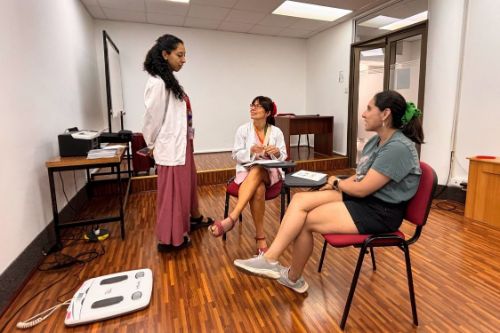Chronotype is defined as an individual's timing preference for daily activity schedules (such as sleeping, eating, or exercising), determined by genetic, biological, psychological, environmental, and social factors. Research in chronobiology has shown that morning or evening preference is associated with different health risks, particularly obesity and chronic diseases related to metabolism.
A review published in Sleep Medicine Reviews—“The human chronotype: A multidimensional construct at the crossroads of physiology and behavior, with important health implications”—by researchers Mariana Cifuentes and Nicolás Tobar from the Institute of Nutrition and Food Technology (INTA), Rodrigo Chamorro from the School of Medicine, and Gabriela Yuri, a doctoral student in Nutrition and Food (DOCNUTAL), all at the University of Chile, examines the available evidence on chronotype and metabolic health, and highlights gaps in knowledge that need to be addressed in future research. Accumulated scientific evidence indicates that evening chronotypes are at greater risk for metabolic problems and chronic diseases, due in part to the difficulty of adjusting to prevailing social and work schedules.
The authors indicate that understanding the molecular, physiological, psychological, and social mechanisms that explain the differences between chronotypes would allow this knowledge to be transferred to clinical practice, thereby improving individualized treatments.
Mariana Cifuentes, head of INTA's Laboratory of Obesity and Energy Metabolism in Geriatrics and Adults (OMEGA) and corresponding author of the study, explains that although genetics contribute to chronotype by about 40% , this is not a fixed trait and can be modified through changes in sleep habits, diet, physical activity, and exposure to light. She also clarifies the findings and prospects of this emerging field:
“The review addresses what we know today about how an early or evening chronotype can influence our metabolic health and, since it is a relatively recent topic, there are many questions to be answered,” she explains.
-Why are evening chronotypes at greater health risk?
The evening chronotype is accompanied by certain characteristics that generally make it more difficult to adapt to the lifestyle of industrialized societies. Typical work and study schedules are not the most convenient for them, and they live “forced” into these schedules, often suffering from sleep deprivation or a mismatch between the hours of activity and rest that are most comfortable for them and those imposed by society. There are several factors derived from this that can compromise their health. Evening people also tend to eat later, which can be another risk factor. We do not know exactly how much certain biological characteristics inherent to the evening chronotype could also directly influence this.
-What mechanisms explain this association between chronotype and metabolic health?
-There are mechanisms that combine habits with biological responses. Our internal clock (which controls circadian rhythms and therefore our metabolism) is regulated by external and behavioral factors, which are different for early and evening chronotypes. For example, excessive light and screen use at night can disrupt healthy, restorative sleep, which has repercussions on our health. As I mentioned earlier, late-night eating habits associated with the evening chronotype can also impair metabolic health.
-What role does genetics play and how modifiable is chronotype?
-It has been estimated that genetics contribute by approximately 40% to each person's chronotype. Thus, there is a biological component to leaning toward certain behaviors, but it is not a fixed trait. There is room for an individual’s decision making regarding how much they expose themselves to stimuli such as food, physical activity, light, and screens at night, for example. There are lifestyle decisions that can be made consciously. In any case, these are all topics currently under investigation.
-What kind of interventions could benefit people with an evening chronotype?
-There are many behaviors that can be modified even when there is a tendency to prefer evening activity. For example, improving eating schedules, physical activity, and paying attention to sleep hygiene.
-How could this information be integrated into public health recommendations or workplace or school policies?
-Research is still ongoing, so it may be too soon to give definitive recommendations on these aspects. The evidence is mounting, but these are very complex issues when it comes to trying to change the schedules of an entire society; even more so because there are many other aspects and interests involved. You can start with individual actions through small steps, such as promoting healthy eating and sleeping schedules, and also limiting screen time at night, especially for children and adolescents.
-What recommendations would you give to someone who wants to adapt their daily habits to their chronotype in order to improve their health?
-Probably the safest recommendation I could give is that if you tend to be an evening chronotype, try to eat during daylight hours, as early as possible. Pay attention to your sleep habits to make sure they are healthy.
Reference: Gabriela Yuri, Rodrigo Chamorro, Nicolás Tobar, Mariana Cifuentes, The human chronotype: A multidimensional construct at the crossroad of physiology and behavior, with important health implications, Sleep Medicine Reviews, Volume 83, 2025, 102142, ISSN 1087-0792,https://doi.org/10.1016/j.smrv.2025.102142.
Keywords: Circadian phase; Chronodisruption; Morning type; Evening type; Health risk; Metabolism






